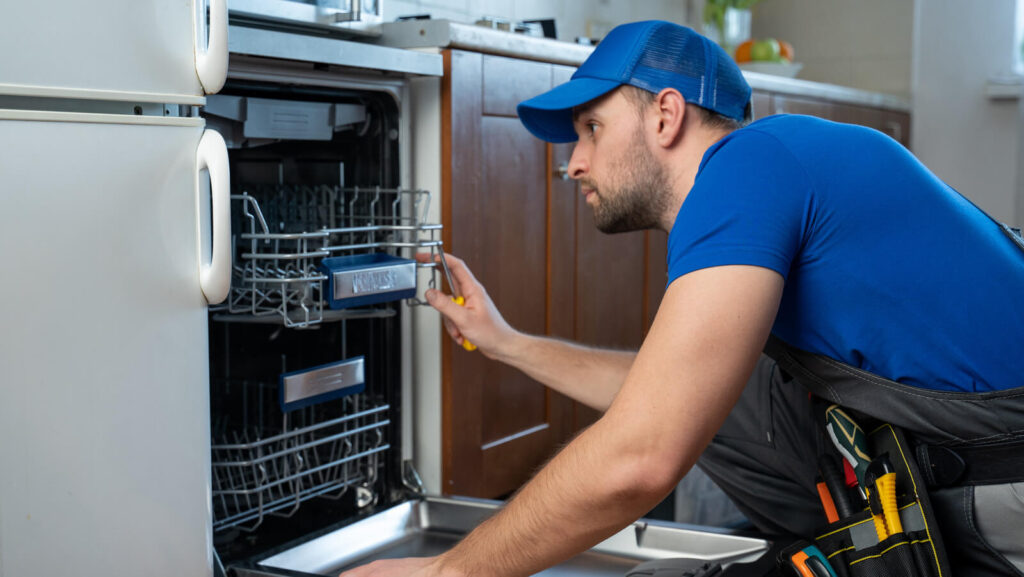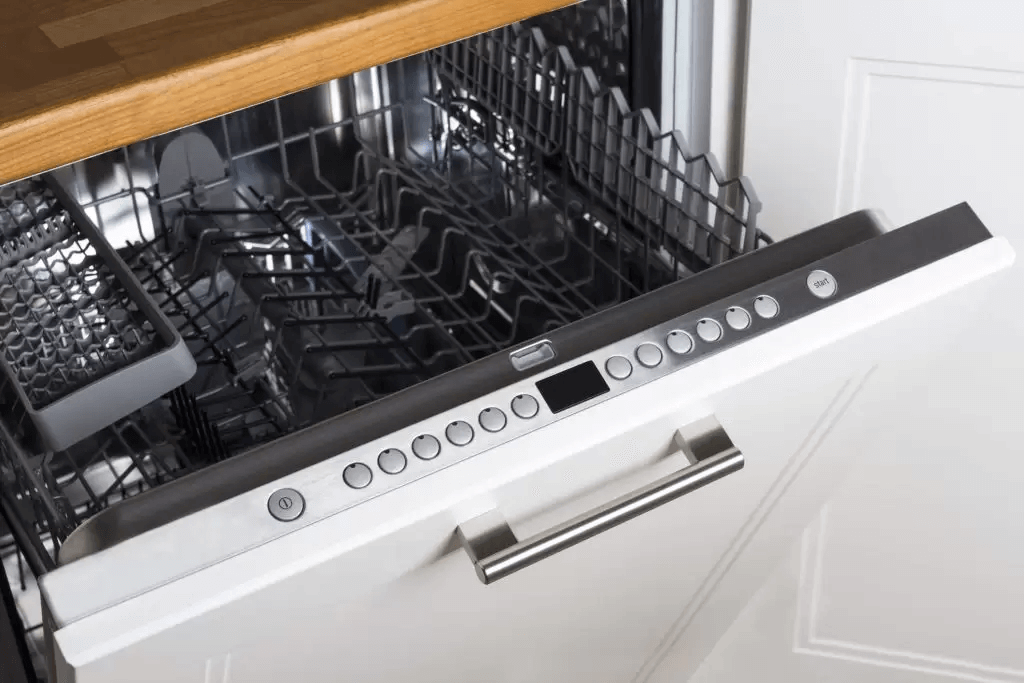
Is your dishwasher creating a symphony of sounds that you never signed up for, or is it shimmying across your kitchen like it’s auditioning for “Dancing with the Stars”? If so, you’re not alone. Noisy and vibrating dishwashers are a common household nuisance, but the good news is that there are numerous ways to tackle this issue. In this comprehensive guide, we’ll explore everything you need to know to bring peace and stability back to your kitchen, from identifying the root causes of the problem to more complex repairs, and even preventive maintenance.
Identifying the Culprit
Before you embark on your mission to silence the dishwasher, it’s crucial to pinpoint the source of the noise and vibrations. To do this, you need to ask some questions and closely examine your appliance. Is it a loose part, an unbalanced load, or a deeper mechanical issue? Let’s break it down step by step:
Loose Items Inside
Question: Is your dishwasher creating a symphony of noise during its wash cycle?
Answer: In many cases, the source of the noise can be traced back to loose items inside the dishwasher. Imagine the clattering of cutlery or small kitchen tools as water jets hit them. To determine if this is the issue, you can follow these steps:
- Open the Dishwasher: Start by opening the dishwasher door and inspecting the inside.
- Check the Bottom: Look closely at the bottom of the dishwasher. Are there any stray utensils or small items that may have fallen into this area?
- Remove Any Debris: If you do find loose items, carefully remove them. Be cautious not to damage the dishwasher’s components in the process.
- Secure Your Items: To prevent a recurrence of this problem, make sure all items in the dishwasher are securely placed in their respective slots or racks.
Unbalanced Load
Question: Is your dishwasher putting on a shaky performance with every wash cycle?
Answer: In some cases, your dishwasher’s wobbly antics can be attributed to an uneven load. Ensuring that dishes and utensils are properly distributed and balanced within the racks can make a significant difference. Here’s what you can do:
- Rack Inspection: Begin by inspecting the dishwasher’s racks. Ensure that they are properly aligned, and the wheels move freely. If you notice any damage or misalignment, consider replacing the affected parts.
- Balancing Act: When loading your dishwasher, distribute the dishes evenly. Heavy items, such as pots and pans, should be placed on the sides to prevent tipping and reduce vibrations.
Spray Arm Issues
Question: Is there a clanging noise reminiscent of a wind chime orchestra coming from your dishwasher?
Answer: The dishwasher’s spray arms are vital for an effective wash cycle, but they can also be a source of noise if they’re obstructed. To check if this is the issue and resolve it, follow these steps:
- Check for Obstructions: Inspect the spray arms for any obstructions. Sometimes, debris or utensils can get caught in them, causing a noisy disruption. Carefully remove any obstructions you find. A toothpick or a small piece of wire can help dislodge debris.
- Regular Maintenance: To prevent this issue from recurring, schedule regular maintenance for your dishwasher. Cleaning the spray arms at least once a month can help prevent obstructions.
Motor and Pump Problems
Question: Is the noise coming from your dishwasher reminiscent of a car with a faulty engine?
Answer: If the noise is a deeper, mechanical rumble, you might be dealing with motor or pump issues. Addressing these problems often requires a more hands-on approach. Here’s what you can do:
- Consult the Manual: Start by locating your dishwasher’s manual. The troubleshooting guide it contains can often provide valuable insights into specific issues and how to address them.
- Inspect the Motor and Pump: Depending on your dishwasher’s make and model, you may need to access the motor and pump. Look for loose or damaged parts, and replace them as necessary.
Simple Fixes for Dishwasher Noise

Once you’ve pinpointed the source of the noise, you can proceed to tackle the issue head-on. Here are some simple fixes for common dishwasher noise problems:
Loose Items Inside
If you’ve identified loose items as the main culprits, here’s what you can do:
- Clear the Dishwasher Bottom: Reach into the dishwasher and retrieve any stray utensils or small items. Be cautious not to damage the dishwasher’s components in the process.
- Secure Your Items: To prevent a recurrence, make sure all items in the dishwasher are secured in their respective slots or racks.
Unbalanced Load
For those wobbly dishwasher performances, follow these steps:
- Rack Inspection: Ensure that the racks are properly aligned and the wheels move freely. If they’re damaged, consider replacing them.
- Balancing Act: Distribute the dishes evenly. Heavy items like pots and pans should go on the sides to prevent tipping.
Spray Arm Issues
To stop the spray arm serenade, try this:
- Check for Obstructions: Examine the spray arms for any obstructions. Remove and clean them thoroughly. A toothpick or small wire can help dislodge debris.
- Regular Maintenance: Schedule regular maintenance to prevent this issue. Clean the spray arms at least once a month.
Motor and Pump Problems
If you suspect motor or pump issues, it’s time for a bit of DIY:
- Consult the Manual: Locate your dishwasher’s manual and follow the troubleshooting guide. It often contains valuable insights into specific issues.
- Inspect the Motor and Pump: Depending on your dishwasher’s make and model, access the motor and pump. Look for loose or damaged parts, and replace as necessary.
Complex Dishwasher Problems
While the simple fixes can resolve many dishwasher noise issues, there are times when the problem goes beyond the basics, and you may need to employ a more technical approach. Here are some complex problems and how to address them:
Inspect the Door Seal
Question: Is your dishwasher producing a high-pitched squeal, or are you noticing water leaks?
Answer: The door seal might be the culprit. Over time, the seal can become damaged or misaligned, leading to both noise and leaks. To address this issue:
- Inspect the Door Seal: Begin by closely inspecting the door seal. Look for any visible wear and tear. If you spot any issues, such as cracks or deformities, you’ll need to replace the seal to maintain a watertight and quiet dishwasher.
Damaged Bearings
Question: Is the noise your dishwasher is making a deep, grinding sound?
Answer: Damaged bearings within the dishwasher’s motor can cause this type of noise. To address the issue, you’ll need to disassemble the dishwasher to access and replace these parts:
- Consult a Professional: Replacing damaged bearings can be a complex task, and it often requires specialized tools. If you’re not comfortable with this level of repair, it’s advisable to consult a professional technician.
Suspended Disposer
Question: Is your dishwasher producing a noise reminiscent of a helicopter taking off during the wash cycle?
Answer: If your dishwasher is connected to a food waste disposer, it’s important to ensure that it’s securely mounted. A loose disposer can cause vibrations and noise:
- Check the Disposer Mounting: Examine the mounting of the food waste disposer. Ensure it is securely attached to the dishwasher and the sink drain. If it’s loose, tighten the mounting bolts to reduce vibrations and noise.
Anti-Vibration Pads

Question: Even after addressing other issues, can you still feel vibrations when your dishwasher is running?
Answer: In some cases, vibrations persist even after other problems have been resolved. Anti-vibration pads can be a useful solution:
- Install Anti-Vibration Pads: Purchase anti-vibration pads designed for dishwashers. Place these pads under the dishwasher’s feet to absorb vibrations and reduce noise.
- Follow the Manufacturer’s Instructions: Ensure you follow the manufacturer’s instructions when installing anti-vibration pads to achieve the best results.
Maintenance Tips for a Quiet Dishwasher
Once you’ve resolved the noise and vibration issues, it’s essential to maintain your dishwasher to ensure it remains in tiptop shape. Regular maintenance can extend the lifespan of your appliance and keep it running smoothly. Here are some maintenance tips to consider:
- Regular Cleaning: Regularly remove debris from the dishwasher’s filter, spray arms, and door gasket. A clean dishwasher not only functions better but also remains quieter.
- Check for Leaks: Periodically inspect for leaks around the door and plumbing connections. Address any leaks promptly to prevent water damage to your kitchen.
- Run Hot Water: Before starting a wash cycle, run hot water in the sink. This helps ensure that the dishwasher gets hot water from the beginning of the cycle, improving its performance.
- Use Quality Detergent: Opt for a high-quality dishwasher detergent. Quality detergents can help prevent buildup and maintain clean dishes.
- Level the Dishwasher: Ensure that your dishwasher is level. An unlevel dishwasher can lead to wobbling during operation, causing noise and vibration.
- Maintain the Garbage Disposal: If your dishwasher is connected to a food waste disposer, keep it clean and clear of debris. A well-maintained disposer can prevent clogs and reduce noise.
When to Call in the Pros
While DIY fixes can resolve many dishwasher issues, there are instances where you should consider calling in the professionals:
- Electrical Problems: If you suspect electrical issues, it’s best to leave the repairs to the experts for safety reasons.
- Persistent Leaks: If you can’t stop leaks even after checking seals and connections, it’s essential to get professional help to prevent water damage.
- Unidentified Noises: If the noise remains a mystery even after your detective work, a technician can diagnose and repair the issue.
- Warranty Concerns: Be cautious about DIY repairs if your dishwasher is under warranty. Tampering with the appliance may void the warranty.
Final Words
Your noisy or vibrating dishwasher doesn’t have to be a permanent member of your household orchestra or dance troupe. Identifying and resolving the issues can bring peace and stability back to your kitchen. Remember to check for loose items, balance your loads, and inspect spray arms regularly. For more complex problems, like motor issues or damaged seals, don’t hesitate to call in the professionals. With a little maintenance and a touch of DIY magic, your dishwasher can go back to quietly doing its job. So, what are you waiting for? Let’s hush that dishwasher and keep the peace in your kitchen! By following the steps and tips outlined in this comprehensive guide, you’ll be well on your way to enjoying a quiet and efficient dishwasher once again.
Frequently Asked Questions (FAQ) – Fixing Noisy or Vibrating Dishwashers
In this FAQ, we address common questions and concerns related to noisy or vibrating dishwashers and provide solutions to help you tackle these issues effectively.
1. What are the common reasons for a dishwasher to make noise or vibrate?
There are several reasons why your dishwasher might be noisy or vibrating, including:
- Loose Items: Small items, cutlery, or utensils can fall to the bottom of the dishwasher, causing noise when the water jets hit them.
- Unbalanced Load: If the dishes and utensils in your dishwasher are not evenly distributed, it can lead to vibrations during the wash cycle.
- Spray Arm Obstructions: Debris or utensils stuck in the spray arms can result in a clanging noise.
- Motor and Pump Issues: Mechanical problems with the motor or pump can create a rumbling or grinding noise.
2. How can I identify the source of the noise in my dishwasher?
To identify the source of the noise, you can follow these steps:
- Loose Items: Open the dishwasher and check the bottom for loose items. Remove any debris or utensils.
- Unbalanced Load: Inspect the racks to ensure they are properly aligned and loaded evenly.
- Spray Arm Issues: Look for obstructions in the spray arms and remove any debris.
- Motor and Pump Problems: Consult your dishwasher’s manual for troubleshooting guidance and inspect the motor and pump for loose or damaged parts.
3. Can I fix a noisy dishwasher myself?
In many cases, you can fix a noisy dishwasher yourself. Simple issues like loose items or an unbalanced load can be addressed without professional assistance. However, if you suspect more complex problems with the motor, pump, or bearings, it’s advisable to consult a technician to avoid causing further damage.
4. How can I prevent my dishwasher from making noise in the first place?
Preventive maintenance can help keep your dishwasher running quietly. Here are some tips:
- Regularly clean the dishwasher’s filter, spray arms, and door gasket.
- Ensure the dishwasher is level to prevent wobbling during operation.
- Use high-quality dishwasher detergent to prevent buildup.
- Run hot water in the sink before starting a wash cycle.
- Inspect for leaks around the door and plumbing connections.
5. When should I call a professional technician to repair my dishwasher?
You should consider calling a professional technician when:
- You suspect electrical issues or problems with the dishwasher’s motor or pump.
- Leaks persist even after checking seals and connections.
- The noise remains unidentified, and you can’t resolve it through DIY methods.
- Your dishwasher is under warranty, and you want to avoid voiding the warranty with DIY repairs.
6. What can I do about a dishwasher with damaged bearings?
If your dishwasher is making a deep, grinding noise due to damaged bearings, it’s a more complex issue. To address it, you’ll need to disassemble the dishwasher to access and replace these parts. It’s advisable to consult a professional technician for this type of repair, as it may require specialized tools.
7. Are there any DIY solutions for reducing dishwasher noise and vibrations?
Yes, there are DIY solutions to reduce dishwasher noise and vibrations. These include:
- Securing loose items in the dishwasher.
- Ensuring even distribution of dishes for a balanced load.
- Checking for spray arm obstructions and cleaning them.
- Installing anti-vibration pads under the dishwasher’s feet to absorb vibrations and reduce noise.
8. What should I do if my dishwasher is connected to a food waste disposer and making noise?
If your dishwasher is connected to a food waste disposer and is producing excessive noise, check the disposer’s mounting. Ensure it’s securely attached to the dishwasher and the sink drain. If it’s loose, tighten the mounting bolts to reduce vibrations and noise.
9. How often should I clean my dishwasher to maintain its quiet operation?
Regular maintenance can significantly contribute to a quiet dishwasher. It’s a good practice to clean your dishwasher’s filter, spray arms, and door gasket at least once a month. This helps prevent debris buildup and maintains smooth operation.
10. Can using anti-vibration pads really make a difference in reducing dishwasher noise?
Yes, anti-vibration pads can make a noticeable difference in reducing dishwasher noise and vibrations. When installed under the dishwasher’s feet, these pads absorb vibrations, preventing them from transferring to your kitchen floor and reducing overall noise levels during operation.